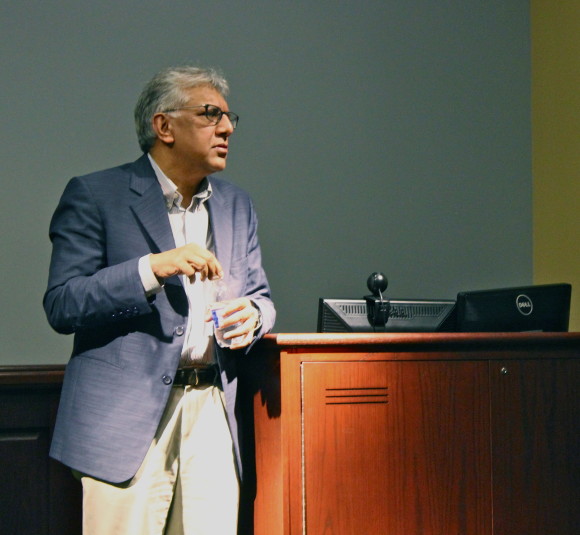 Our Emily Dickinson lecturer, Pulitzer-Prize winning poet Vijay Seshadri, gave a reading last Thursday. Students and faculty filled every seat in Foster Auditorium, and still more stood in the back as Julia Kasdorf introduced Seshadri, describing his work as “imaginatively and concretely expressing what it’s like to be alive.” She even shared her poetry students’ thoughts on his work, how he writes from “the point of view of a watcher among people.” Seshadri began his reading by joking, “since it’s almost Halloween, let’s start with death,” and read A Fable, a narrative poem from his second collection, A Long Meadow. He then read Trailing Clouds of Glory and Nursing Home, followed by a four-poem sequence of lyric poems inspired by Dante’s Divine Comedy, Hell, Purgatory: The Film, Purgatory: The Sequel, and Heaven. Afterwards, he continued his reading with a ‘poem of the moment’ called This Morning, then Guide for the Perplexed, Bright Copper Kettles, Thought Problem, and Knowing. His final poem of the night was Light Verse, a poem he wrote for the New York Times to mark the end of daylight savings time.
Our Emily Dickinson lecturer, Pulitzer-Prize winning poet Vijay Seshadri, gave a reading last Thursday. Students and faculty filled every seat in Foster Auditorium, and still more stood in the back as Julia Kasdorf introduced Seshadri, describing his work as “imaginatively and concretely expressing what it’s like to be alive.” She even shared her poetry students’ thoughts on his work, how he writes from “the point of view of a watcher among people.” Seshadri began his reading by joking, “since it’s almost Halloween, let’s start with death,” and read A Fable, a narrative poem from his second collection, A Long Meadow. He then read Trailing Clouds of Glory and Nursing Home, followed by a four-poem sequence of lyric poems inspired by Dante’s Divine Comedy, Hell, Purgatory: The Film, Purgatory: The Sequel, and Heaven. Afterwards, he continued his reading with a ‘poem of the moment’ called This Morning, then Guide for the Perplexed, Bright Copper Kettles, Thought Problem, and Knowing. His final poem of the night was Light Verse, a poem he wrote for the New York Times to mark the end of daylight savings time.
Elizabeth Benedict Reading
Our Mary E. Rolling Reading Series kicked off on Thursday with a reading by Elizabeth Benedict. Benedict is the author of several books, including The Beginner’s Book of Dreams, Almost, and The Joy of Writing Sex. Her latest book, Me, My Hair, and I: Twenty-Seven Women Untangle an Obsession will be released on on September 29, 2015.
Benedict opened with the first chapter of her book The Beginner’s Book of Dreams, followed by her essay, What We Talk About When We Talk About Money, which appears in the 50th anniversary issue of Salmagundi. Her final reading was from her latest work, Me, My Hair and I.
Graduating BA/MA Reading!
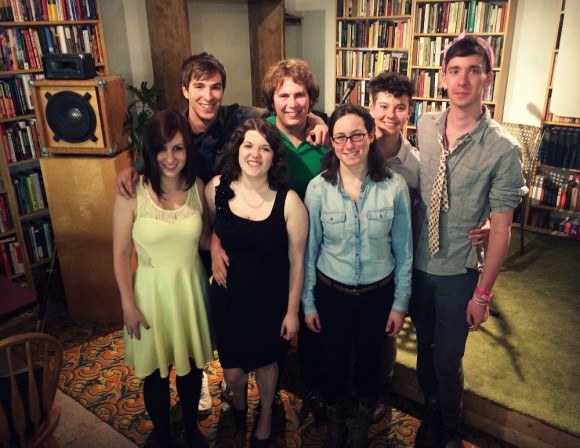 Last year’s BA/MA graduating class in their post-reading glow.
Last year’s BA/MA graduating class in their post-reading glow.
In case you missed last year’s BA/MA graduating cohort’s reading at Webster’s and you are still devastated by the loss, never fear! The tradition continues this Saturday, May 2, at Webster’s Bookstore Cafe from 2:30-4:30. All are welcome to immerse themselves with delicious treats, excellent readings from talented writers, and an almost crushing sensation of nostalgia and love.
First Book Festival, April 2015
Our first-ever First Book Fest (held April 3 & 4) brought together MFA poetry grads who came back to campus to read from their books of poetry and lead community poetry workshops, BA/MA poetry students who introduced the poets at their readings, writing professors, students, community members, and other poetry fans. Thanks to everyone who made the event a success, especially Julia Kasdorf, who conceived, planned, and made the event a reality!
[slider id=’384′ name=’First Book Festival, 4/3-4/4/15′]
Jess Walter Visit
Jess Walter Poster courtesy of The Center for American Literary Studies at Penn State
Jess Walter, bestselling author of Beautiful Ruins and the recent We Live in Water, was this year’s Steven Fisher Writer-in-Residence, visiting our (slightly warmer, finally!) campus from March 16-20, and his visit brought more than just better weather. Jess spoke with our 512 fiction writing class about his personal writing process (“It usually begins with coffee and a big cookie.”), what it means to live as a writer (“Writing is my religion. I go to the church of writing.”), and how it feels to write from the perspective of a character who is completely different from yourself (“I’d have to remind myself, the kids are coming home now, I can’t be saying the ‘F’ word.”).
A handful of us were lucky enough to get the opportunity to have one-on-one workshop sessions with Jess, and we unanimously report that these sessions were wholly awesome. Jess was helpful in the best way; he’s a great reader, and seemed to understand exactly what we were hoping to achieve with our stories. All of his advice was administered to help push us further in the direction that we were already hoping to go. He called our writing ambitious but successful, vague at times but, in a few moments, beautiful. And that’s among the coolest things any of us could have asked for from someone with Jess Walter’s talent.
As an added bonus to one of the most exciting academic weeks ever, Jess ate Indian food and talked Robert Durst, charming criminals, and really awesome dogs with us. He gave a reading that was equal parts hilarious and sad to cap off his visit, and signed our books as we said our goodbyes. The BA/MAs are still raving about his visit and reading, and have the Instagrammed posts of our signed books to prove it.
March Write Night!
Student Writers: Mark your calendars for our next WRITE NIGHT at Webster’s: Friday, 3/27, 3-5 pm.
Join a community of student writers for our next night (ok, afternoon) designed to invigorate your writing life — burst into spontaneous writing, share your writing with friendly ears, get constructive feedback, discuss publishing opportunities, and more. The third in our series of writer gatherings designed to build an even more encouraging student writing community in State College. Sponsored by the Penn State English Department and run by BA/MA creative writing students. Meet in the backroom, where you’ll find food/drink, sparkling wit, direction and ideas. FREE!
For a complete list of Webster’s events, click here!
A Message to the Ba/Ma Gang, from Nick Miller
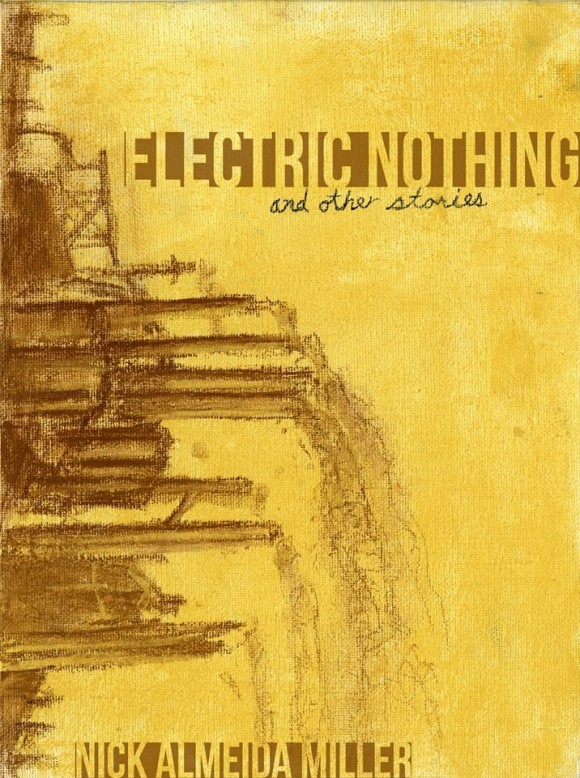 Cover art for Nick’s Ba/Ma thesis by Kyle Dawson
Cover art for Nick’s Ba/Ma thesis by Kyle Dawson
Nick Miller, not to be confused with this Nick Miller, is a Ba/Ma class of 2014 graduate, and a current Michener fellow. To the Ba/Ma class of 2015, he is a good friend, an irreplaceable presence in workshop, an intimidatingly talented brotherly-teacherly figure inside and outside of the classroom, and a purveyor of the inadvisable-to-consume Uncle Runkle’s.
First, some good news: by most metrics, there is life post-Ba/Ma, though I admit those blood- pressure fractions have always confused me. In my case, life post-Ba/Ma is in Austin, Texas. Before the prodigious James A. Michener died, he used his estate to fund artists, to build museums, to establish the National Poetry Series(*1), and to design an MFA program in his name. Oddly enough, Michener and I hail from the same sleepy, small-potatoes Bucks County, Pennsylvania. I have followed Mr. Michener to Texas, to the James A. Michener Center for Writers, where I’m a first year fiction fellow, writing stories and screenplays.
There is a fretful, unifying moment: a cohort of weirdos show up for the first day of graduate school. In each of our minds, we know ourselves to be horrible phonies. We hope to keep this a secret, at least until we can cobble together our first book manuscript. Then, Elizabeth McCracken(*2) (or some iteration of Elizabeth McCracken), enters and stands before the seminar table. She says, “Rule one. Stop asking yourselves whether or not you are writers. The word write is a verb. Are you a doer of that verb? Do you write? If not, sorry, you are not a writer. If so, congratulations! Your psychological torment ends today!”(*3)
This advice wrenched me. As I drive over the sparkly Colorado River and look down, I see rowers. Are they rowers by profession? Are they rowers because they’ve won rowing awards? Do their peers, when reviewing the rowers’ skills, deliver unto them only compliments? Is that what makes them rowers? No! They are rowers because, um, they’re rowing. I am a writer not because I was hand-selected by Minerva, nor because Toni Jensen cracked my heart like an egg over Brady Udall’s stories(*4). I am a writer because I write(*5). I am a doer of that verb. And so are you. I’m sorry if this seems painfully obvious, but it’s the utter simplicity that I find so empowering.
One more takeaway that recently sucker-punched me. Have y’all(*6) seen Whiplash yet? What an alive story of the artist’s growth, suffering for craft, the true and false rewards of self-criticism. There are these great sequences when J.K. Simmons (a malevolent jazz instructor) and Miles Teller (his young drumming student) are face-to-face, sometimes in a shot-reverse-shot series of close-ups, and sometimes sharing a single frame. Simmons’ face is heavily creased, and wormlike veins decorate his bald skull. Teller is nineteen years-old, almost cherubically full-faced, with scars that belie his innocence. A viewer can’t help but think: why is this young person torturing himself? Why is he turning his face into the face of the beleaguered, older man? The antithesis the film presents itself: to be great, the young artist must torture himself, must sweat out ability to achieve greatness. Of course, this is too easy to be true.
My takeaway: don’t make the same mistake as the young drummer. Is pushing oneself beneficial? Yes. Is torture a necessary ingredient for greatness? No. So if you are the self-flagellating, I’m-not-good-enough type(*7), stop wasting your time on torment, and get back to that sacred verb. Write(*8). Within you, the stories are waiting.
1 In your midst is the magnificent Charlotte Holmes—a past winner of the N.P.S.
2 Don’t read this. Read The Giant’s House or Thunderstruck & Other Stories by Elizabeth McCracken.
3 Of course, Elizabeth McCracken is very smart, and this is a very paraphrased version of her wonderful, lucid advice.
4 Letting Loose the Hounds. Yowzer.
5 Try saying this aloud. I dare you. What liberation!
6 I am not a proud man.
7 As I have been over and over throughout my life.
8 Thank you for indulging me in this. I love and miss you all, and know that you are in a good, good place.
Elizabeth Kadetsky Reading
Image from elizabethkadetsky.com
Our own Elizabeth Kadetsky gave a reading from the beginning of her forthcoming novella, On an Island at the Center of the Center of the World, as part of the Mary E. Rolling Reading Series on Thursday, February 26 in Foster Auditorium. Elizabeth’s published work includes fiction, memoirs, personal essays, and narrative journalism. She has a published memoir with Little, Brown called First There Is A Mountain: A Yoga Romance, an account of her year spent in India as a Fulbright scholar studying with famed yoga master BKS Iyengar, and which explores her yogic journey with the fearless intuitions of a journalist and the powerful and careful prose of an accomplished essayist.
Andrew Foster Altschul has said of her forthcoming novella that “Elizabeth Kadetsky’s malta is a land of unstable identities and suppressed violence, a blank map onto which her characters’ confusion and paranoia are projected. Kadetsky’s novella brilliantly dramatizes a foreigner’s sense of otherness, and the looming panic of a woman trying to pick up the pieces of her life by escaping the self,” an observation which aptly sums up one of many of Kadetsky’s great strengths as a writer.
We had a wonderful evening getting to listen to Elizabeth read and can’t wait to get our hands on her novella–due out this April!
Write Night
After the roaring success of our first Write Night, the BA/MAs will host our second (and now monthly!) Write Night (or afternoon) at Webster’s Bookstore Cafe tomorrow, February 20, from 3-5 pm. All are welcome for this free event. Join a community of student writers for our next night (ok, afternoon) designed to invigorate your writing life — burst into spontaneous writing, share your writing with friendly ears, get constructive feedback, discuss publishing opportunities, and more. The second in our series of writer gatherings designed to build an even more encouraging student writing community in State College. Sponsored by the Penn State English Department and run by BA/MA creative writing students. Meet in the backroom, where you’ll find food/drink, sparkling wit, direction and ideas. Once again, this event is free and open for all!
Cathleen Miller Reading
Photo of Cathleen Miller and Charlotte Holmes from Author Cathleen Miller’s Facebook page.
PSU MFA Alum Cathleen Miller visited Penn State on January 29 to give a talk on her life as a writer and her experiences at Penn State and beyond, as well as to read several segments from books she has published and books she is working on. Cathleen also held a Q&A session in the class of Toby Thompson, one of her former advisers, where she offered advice on pursuing travel writing and the importance of persistence and aggression when it comes to getting published.
Among other texts, Cathleen read from The Birdhouse Chronicles, her published MFA thesis, which described the life she found when she moved from her competitive advertising job in San Fransisco to live in rural Pennsylvania with her husband. She has a keen eye for detail and her writing is just as funny and fresh as it is exalting and beautiful. Cathleen also read from her book Desert Flower, the incredible true story of a nomad turned supermodel turned United Nations activist, which has sold over 11 million copies.

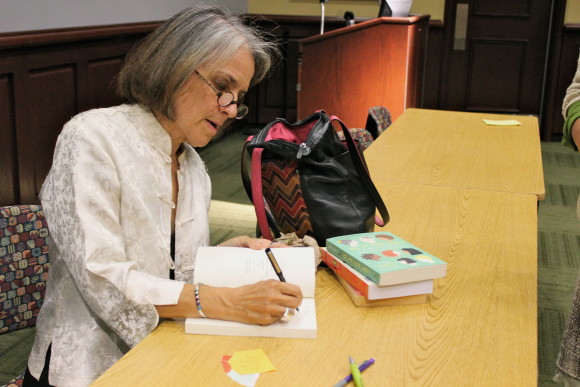
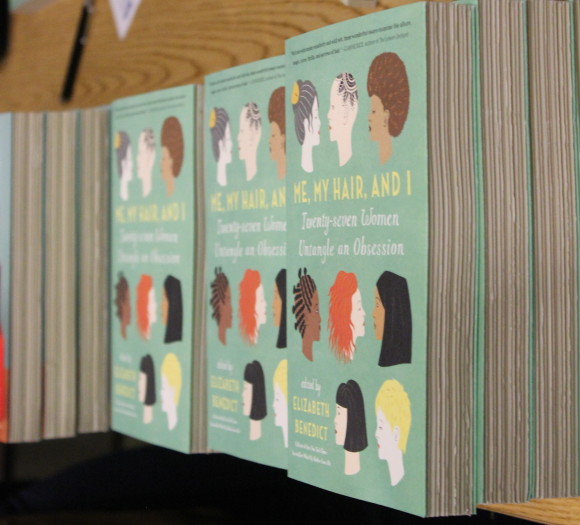
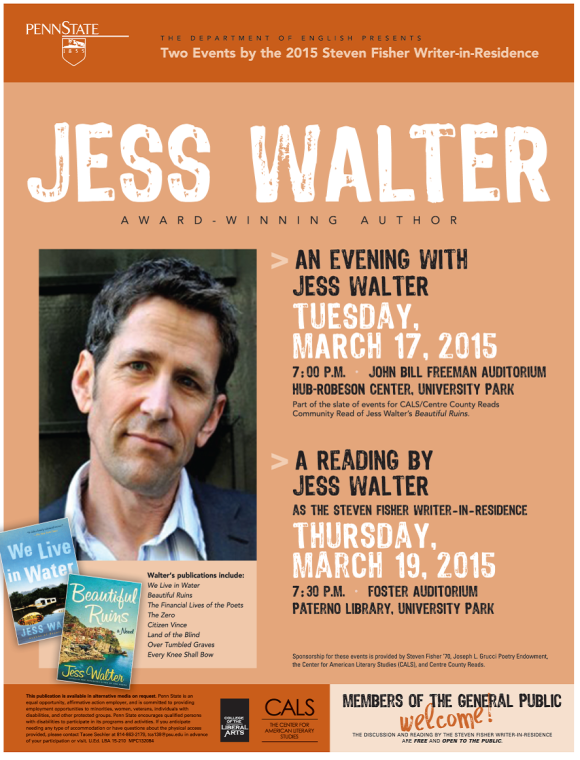

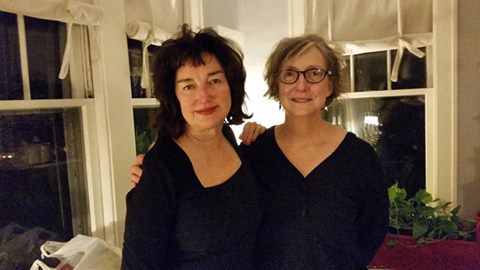
You must be logged in to post a comment.